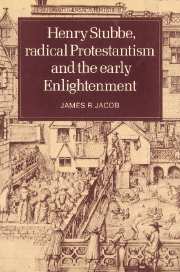Book contents
- Frontmatter
- Contents
- Miscellaneous Frontmatter
- Preface
- Introduction: the historiographical problem
- 1 Hobbesian Independent
- 2 Republican Independent
- 3 Surreptitious naturalism: the invention of a new rhetoric
- 4 ‘Mahometan Christianity’: Stubbe's secular historicism
- 5 Aristotle on the ale-benches
- 6 Court pen: ‘ancient prudence’ and royal policy
- 7 Court to country
- 8 Civil religion and radical politics: Stubbe to Toland
- Epilogue: the paganizing thread
- Notes
- Bibliographical Note
- Index
5 - Aristotle on the ale-benches
Published online by Cambridge University Press: 14 October 2009
- Frontmatter
- Contents
- Miscellaneous Frontmatter
- Preface
- Introduction: the historiographical problem
- 1 Hobbesian Independent
- 2 Republican Independent
- 3 Surreptitious naturalism: the invention of a new rhetoric
- 4 ‘Mahometan Christianity’: Stubbe's secular historicism
- 5 Aristotle on the ale-benches
- 6 Court pen: ‘ancient prudence’ and royal policy
- 7 Court to country
- 8 Civil religion and radical politics: Stubbe to Toland
- Epilogue: the paganizing thread
- Notes
- Bibliographical Note
- Index
Summary
I will add, the little credit the Church of England has amongst the people; most men being almost as angry with that popery which is left amongst us (in surplices, copes, altars, cringings, bishops, ecclesiastical courts, and the whole hierarchy; besides an infinite number of useless, idle superstitious ceremonies; and the ignorance and viciousness of the clergy in general) as they are with those dogmas that are abolished.
Henry Neville, Plato RedivivusWith the publication of The Miraculous Conformist in 1666, Stubbe resumed a polemical career in which he speaks with his old anticlerical ‘Hobbesist’ voice, though no longer freely but in a code full of cryptic meanings. We are now in a position to examine the principal sequence in his career as an early Restoration polemicist, his famous attacks on the Royal Society, delivered and published between 1669 and 1671. In these he defended Aristotle, Galen and Scholastic learning against the new philosophy of the Royal Society, as it was put forward by Thomas Sprat and Joseph Glanvill. The standard accounts of the controversy have interpreted him as a conservative defender of church and monarchy, wedded to the old Scholastic ‘humanism’ against the new scientific ‘naturalism’ and fighting a rearguard action against science and progress. Were this view correct, Stubbe would have had to make a considerable about-face between early 1666 and 1669 when the controversy began.
- Type
- Chapter
- Information
- Publisher: Cambridge University PressPrint publication year: 1983



